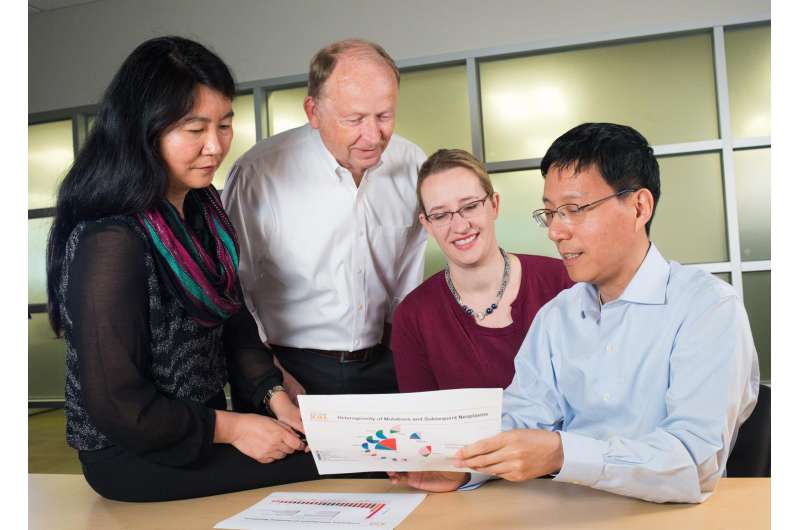Study finds more childhood cancer survivors would likely benefit from genetic screening

Twelve percent of childhood cancer survivors carry germline mutations that put them or their children at increased risk of developing cancer, according to a landmark study presented today at the annual meeting of the American Association for Cancer Research. The findings from St. Jude Children's Research Hospital are expected to have an immediate and potentially life-saving impact on the growing population of childhood cancer survivors.
The study of more than 3,000 long-term St. Jude childhood cancer survivors is apparently the first time whole genome sequencing has been used in a large group of cancer survivors to study the impact of genetic factors on the lifetime cancer risk.
"These results suggest that many more childhood cancer survivors would likely benefit from genetic screening and counseling," said Leslie Robison, Ph.D., chair of the St. Jude Department of Epidemiology and Cancer Control. "For cancer survivors, this research marks the beginning of a new era in cancer surveillance and prevention." He and Jinghui Zhang, Ph.D., chair of the St. Jude Department of Computational Biology, are co-senior authors.
Researchers recommended expanding genetic screening and counseling to include childhood cancer survivors who have been diagnosed with second cancers and whose pediatric cancer treatment did not include radiation therapy. Referrals are also now recommended for survivors whose initial treatment included radiation therapy and who have developed secondary breast cancer, thyroid cancer or sarcomas at the radiation treatment sites. Currently genetic screening for germline, typically inherited, mutations is reserved for survivors with family histories of cancer.
Along with enhanced screening for survivors, the findings should aid in designing personalized therapeutic approaches based on the genetic profiles of children who are newly diagnosed with cancer.
"While there is extensive scientific literature on the late effects of cancer therapy, including the risk that survivors will develop subsequent malignancies, until now little was known about the genetic contribution," Zhang said. "Based on these findings, we estimate that more than 32,000 of the more than 400,000 childhood cancer survivors in the U.S. are at risk for second or even third cancers because they carry mutations in known cancer predisposition genes."
The research focused on pathogenic or likely pathogenic germline mutations in 156 genes that are associated with an elevated cancer risk. The list included 60 genes—cancer predisposition genes inherited in an autosomal dominant manner—that leave carriers at risk for cancer when even one of the two copies of the gene is altered. Twelve percent of the 3,007 study participants had cancer-related mutations in one of the 156 cancer-risk genes, and about 6 percent had such mutations in one of the 60 cancer-predisposition genes.
Previously, St. Jude researchers reported that 8.5 percent of newly diagnosed pediatric cancer patients carry mutations in one of the 60 cancer-predisposition genes. "We anticipated that we would find the mutations in a similar or slightly lower proportion of long-term childhood cancer survivors," Zhang said.
A total of 26 survivors had mutations in either the BRCA1 or BRCA2 genes that are associated with breast cancer, not pediatric cancer, making them among the most commonly mutated genes in this study. Breast cancer was also one of the most frequently diagnosed second cancers. There were 60 cases of breast cancer in 53 study participants. Other frequently mutated genes were RB1, NF1 and TP53.
The genetic contribution to cancer risk varied across the 448 survivors with one or more subsequent cancers. Among survivors whose pediatric cancer treatment did not include radiation and who developed second cancers, 19 percent carried mutations in one of the 156 cancer-risk genes. In contrast, genetics was not associated with the increase in non-melanoma skin cancers or meningioma experienced by survivors whose pediatric cancer treatment included radiation. However, survivors who carried high-risk mutations and had received radiation therapy for pediatric cancer were at an 11-fold increased risk for developing secondary breast cancer and sarcomas.
The researchers noted that mutations in cancer predisposition genes do not always lead to cancer. "While these mutations put survivors or their children at higher risk for cancer in the future, they do not mean cancer is inevitable," said Zhaoming Wang, Ph.D., of St. Jude Computational Biology. He presented the findings and is co-first author of the study with Carmen Wilson, Ph.D., a St. Jude Epidemiology and Cancer Control research associate. He added: "As we identify and understand more about germline mutations in cancer-predisposition genes, we expect to find that genetics plays an even more substantial role in the life-long cancer risk of some survivors."














